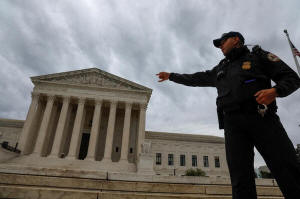U.S. Supreme Court poised to hear Alabama voting rights fight
 Send a link to a friend
Send a link to a friend
 [October 04, 2022]
By Andrew Chung and Nate Raymond [October 04, 2022]
By Andrew Chung and Nate Raymond
WASHINGTON (Reuters) - The U.S. Supreme
Court is set to hear arguments on Tuesday in a major legal battle that
threatens to further undermine a landmark federal voting rights law as
the state of Alabama defends a Republican-drawn electoral map faulted by
judges for diluting the clout of Black voters.
A three-judge federal court panel invalidated the map delineating the
boundaries of Alabama's seven U.S. House of Representatives districts.
But the Supreme Court, in a 5-4 decision in February, let Alabama use
the map for the Nov. 8 U.S. congressional elections in which Republicans
are trying to regain control of Congress.
The Supreme Court is due to hear two consolidated cases brought by Black
voters challenging the legality of the map. The dispute gives the court,
with its 6-3 conservative majority, a chance to further roll back
protections contained in the 1965 Voting Rights Act, which prohibits
racial discrimination in voting.

Tuesday will mark liberal Justice Ketanji Brown Jackson's second day of
hearing arguments as a member of the court. Appointed by Democratic
President Joe Biden, she is the first Black woman to serve on the
nation's highest court. On Monday, she proved to be an energetic
questioner, peppering attorneys with queries and follow-ups in two
cases.
Conservative Chief Justice John Roberts joined the court's liberals in
dissent from the February decision allowing the Alabama map to go into
use, but previously has voted to limit the Voting Rights Act's reach.
The lower court found that Alabama's map diminished the influence of
Black voters by concentrating their voting power into a single House
district even though the state's population is 27% Black, while
distributing the rest of the Black population in other districts at
levels too small to form a majority.
Alabama has argued that drawing a second district to give Black voters a
better chance at electing their preferred candidate would itself be
racially discriminatory by favoring them at the expense of other voters.
If the Voting Rights Act required the state to consider race in such a
manner, according to Alabama, the statute would violate the U.S.
Constitution's 14th Amendment guarantee of equal protection under the
law.
[to top of second column]
|

A U.S. Supreme Court Police officer
gestures on the plaza of the U.S. Supreme Court building on the
first day of the court's new term in Washington, U.S. October 3,
2022. REUTERS/Jonathan Ernst

Democratic President Joe Biden's administration and a number of
voting rights groups backing the plaintiffs have said that a ruling
favoring Alabama would threaten certain electoral districts in other
states - for the U.S. House and state legislatures - potentially
diminishing minority representation in politics.
The Voting Rights Act was enacted at a time when Southern states
including Alabama enforced policies blocking Black people from
casting ballots. The case centers on a Voting Rights Act provision,
called Section 2, aimed at countering voting laws that result in
racial bias even absent racist intent.
Conservative states and groups already have successfully prodded the
Supreme Court to limit the Voting Rights Act's scope. Its 2013
ruling in another Alabama case struck down a key part that
determined which states with histories of racial discrimination
needed federal approval to change voting laws. In a 2021 ruling
endorsing Republican-backed Arizona voting restrictions, the
justices made it harder to prove violations under Section 2.
Some of Alabama's supporters have told the Supreme Court that the
challenges to the map are merely attempts to help the Democratic
Party win elections, as Black voters overwhelmingly favor Democratic
candidates.
Electoral districts are redrawn each decade to reflect population
changes as measured by a national census, last taken in 2020. In
most states, such redistricting is done by the party in power, which
can lead to map manipulation for partisan gain.

In a major 2019 ruling, the Supreme Court barred federal judges from
curbing the practice, known as partisan gerrymandering. That ruling
did not preclude court scrutiny of racially discriminatory
gerrymandering.
A decision is expected by the end of June.
(Reporting by Andrew Chung; Editing by Will Dunham)
[© 2022 Thomson Reuters. All rights
reserved.]
This material may not be published,
broadcast, rewritten or redistributed.
Thompson Reuters is solely responsible for this content. |